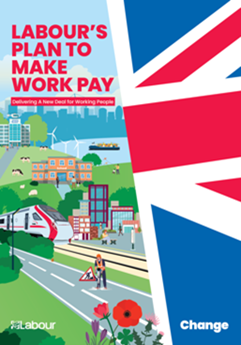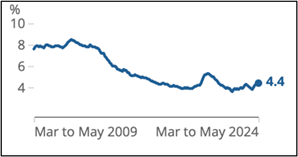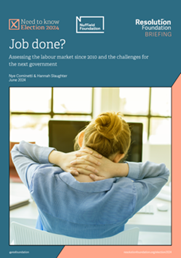
July's Labour Market Insights
22 Jul, 20245 minsWelcome to the July edition of Meridian Insights. The Labour Party have won a landslide gene...

Welcome to the July edition of Meridian Insights. The Labour Party have won a landslide general election victory with a majority of 174 seats. The new Prime Minister, Sir Keir Starmer, has vowed to run a “government of service and to kick start a period of national renewal”. We are entering a period of major change to the UK political and economic landscape. We don’t know all the details yet, but rest assured at Meridian, we will always be as informed as possible … and pass that information on to you.

Labour Market Overview
The latest ONS Labour Market Overview shows that:

- UK unemployment rate increased slightly to 4.4%, with 1.528 million people unemployed
- Unemployment amongst young people increased and remains high, particularly in the youngest age group (aged 16-17 = 28.3% / aged 18-24 = 12%)
- Employment rate was largely unchanged at 74.4%, with 32.99 million people employed
- The UK's economic inactivity rate was slightly down in the last quarter at 22.1%, higher than 12 months ago. The quarterly decrease was largely due to those aged 16 to 24, and they were also largely responsible for the annual increase as well
- 9.383 million people are economically inactive, an increase of 390,000 on last year and 883,000 higher than pre-pandemic levels
- Vacancies fell again to 889,000, and the 24th-period fall, down 30,000 from the previous quarter, but higher than pre-COVID levels. This means there were 1.7 unemployed people per vacancy from March 2024 to May 2024, an increase from the previous quarter due to falling vacancy numbers and rising unemployment
- Payrolled employees for June 2024 were 30.4 million, a rise of 0.8% compared to last year. This is a rise of 241,000 over the last 12 months. 1.42 million higher than pre-pandemic levels
- Annual growth in regular pay without bonus increased by 5.7%, and with bonus by 5.7%, this was the lowest growth since 2022. Adjusted for inflation, annual growth regular pay was 2.5%, and total pay was 2.2%
- Claimant count increased by 32,300 on the month and 127,900 on the year to 1.663 million. This is the measure of those receiving benefits principally due to being unemployed
- Redundancies decreased to 3.4 per thousand employees, slightly lower than last year
- 49,000 working days were lost because of labour disputes in May, up from 17,000 in the previous month

The new Work and Pensions Minister, Liz Kendall, has set out the Government’s Back to Work Plan, with tackling economic inactivity at the top of the list. There are three pillars to the plan:
- A new national jobs and career service to help get more people into work and on in their work, combining the current Jobcentres and the National Career Service
- New work, health, and skills plans for the economically inactive are led by mayors and local areas.
- A youth guarantee for all young people aged 18 to 21.
She said, “We’ll create more good jobs, make work pay, transform skills, and overhaul jobcentres, alongside action to tackle the root causes of worklessness including poor physical and mental health”

On the 17th July, King Charles delivered the first Labour King’s Speech in 14 years. The government announced it will bring 35 bills and draft bills before Parliament. There are ten key areas of focus, two of which will impact on the labour market:
- Make work pay - “Our Employment Rights Bill is a significant step towards delivering this Government’s plan to make work pay – the biggest upgrade to workers’ rights in a generation. We will ban exploitative zero-hours contracts, end fire and rehire, and introduce basic employment rights from day one. And through our changes to the Low Pay Commission, we’ll make sure the minimum wage is a genuine living wage”.
- Break down barriers to opportunity - “We’ll take action to raise educational standards and break down barriers to opportunity. This includes measures to help people back into employment after the pandemic and a Bill to raise standards in education and promote children’s wellbeing. Our plan also includes reforming the apprenticeship levy and setting out work on legislation to enshrine the full right to equal pay in law”.

People Management reports on analysis by employment law firm GQ Littler that more than one million fit notes relating to mental and behavioural disorders were issued by the NHS in the UK last year, with 42% of those signed off work for a month or longer.
The reason behind the large number of fit notes could be the increased scope of PTSD diagnoses, increased awareness around mental health, decreased stigma and the continued fall out of the impact of Covid restrictions on mental health. In total, 10 million fit notes were distributed in the UK, 4.5 million of which signed workers off for more than a month.

The Guardian reports on a survey of UK undergraduates by the Higher Education Policy Institute which found a record 56% had paid employment whilst studying, working an average of 14.5 hours each week. They were having to work long hours in jobs to support themselves in university owing to the cost-of-living crisis. This is creating a two-tier system between those students that have to work while their better off peers are free to concentrate on their studies.
Bright Horizons latest UK Work + Family Snapshot found these four key insights point the way for employers of choice:
There is a notable variation in how different generations need and use family benefits.
The Resolution Foundation published Job Done?, which assesses the labour market since 2020 and the challenges facing the next government. Key findings are:
Successive Conservative governments have boosted pay for the lowest earners with ambitious increases in the minimum wage.
HR Review reports on research published by Pro Time UK (workforce management systems) that a staggering 54% of UK employees report working between half a day and four days of unpaid overtime each month, amounting to 19 million days of uncompensated labour annually. The findings also indicate that one in five workers plans to leave their current job within the next six months to escape the pressures of overwork. Additionally, nearly half (49%) refuse to take on extra work, and 42% avoid pursuing management responsibilities due to the same issue.
ADP Research Institute (part of ADP HR and Payroll systems) published People at Work 2024: A Global Workforce View. Pay tops the list of worker priorities in all four regions and every age group. Compared to their counterparts across Europe, more workers in the UK think they’re paid fairly for their role (58%) and their skill set (57%), but both numbers fall far short of the global averages (66% and 65% respectively). And 15% of workers in the UK are unhappy with their enjoyment of the job, the largest share of any country in Europe and second only to Japan (19%).
UK Immigration Policy
‘Strengthen our border’ is one of the government’s key commitments in the King’s Speech, stating, “The government will strengthen the border with a new Bill that modernises the asylum and immigration system, including launching a new Border Security Command. The command will deploy more police and investigators to smash the criminal smuggling gangs, tackling the problem at its source. The Bill will give law enforcement new enhanced counter-terror style powers to destroy the evil business model of human trafficking”. |



















